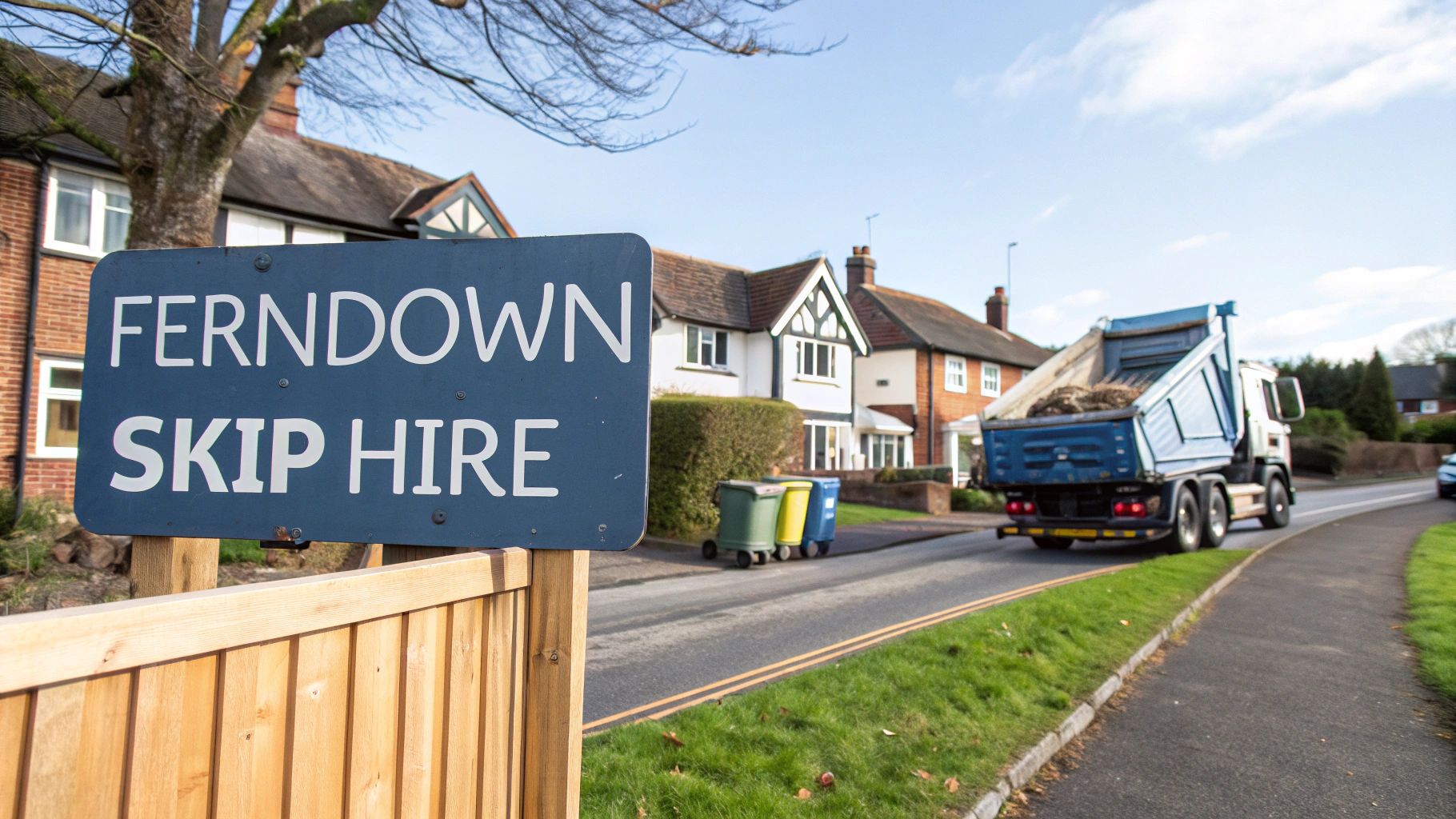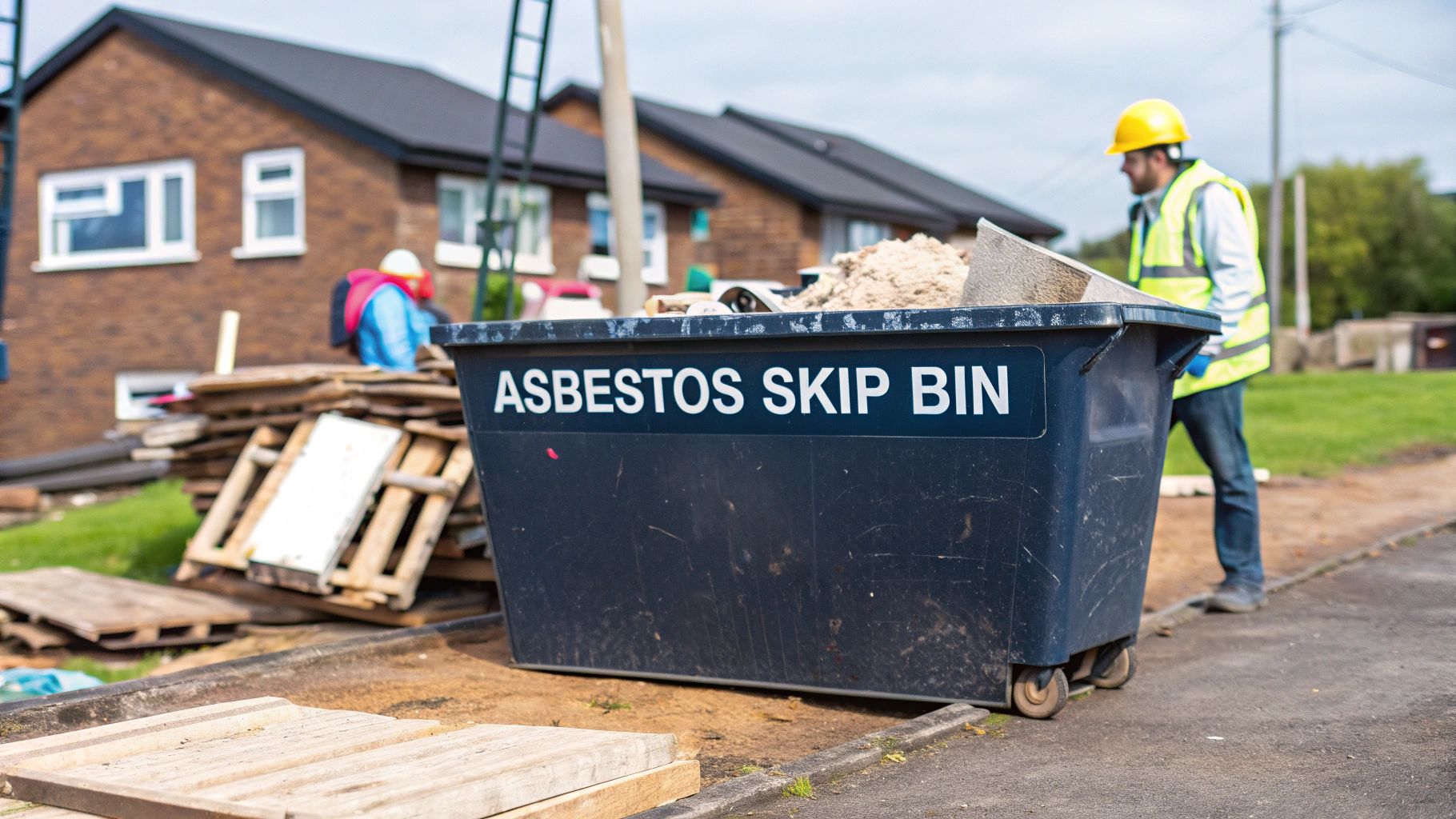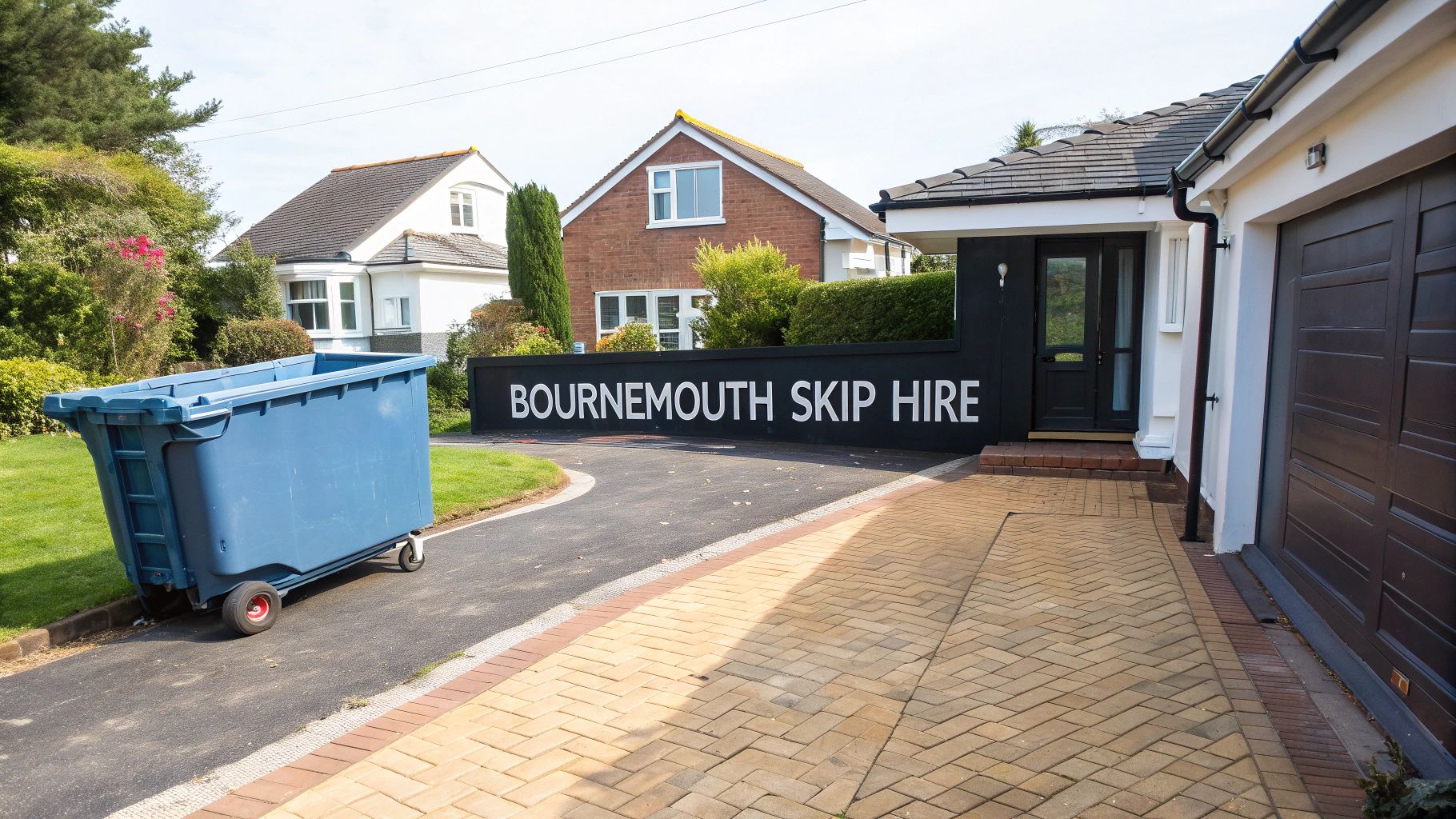Your Guide to Skip Hire in Dorset
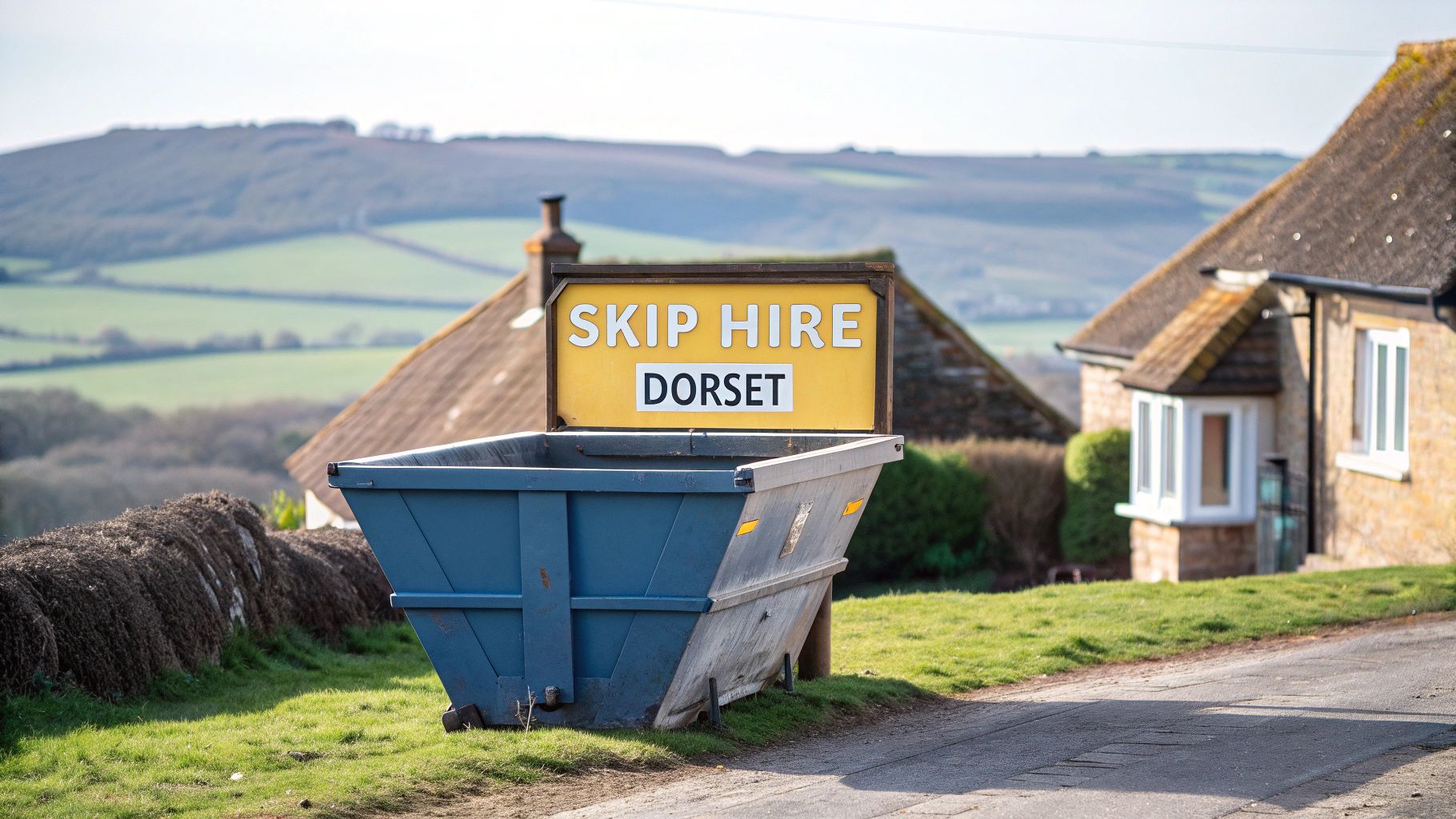
Your Guide to Skip Hire in Dorset
Whether you're tackling a simple garden clear-out or diving into a full-blown renovation, you’re going to make a mess. For any project across Dorset, skip hire offers the most straightforward and efficient solution for dealing with the rubbish, saving you time, money, and endless trips to the local tip.
Why Skip Hire Is Your Smartest Project Decision
It’s easy to get caught up in the excitement of a new project, but the reality of managing the leftover debris often gets pushed aside until it’s piled high. This is where thinking ahead about waste disposal really pays off. Instead of letting rubbish accumulate or making stressful, back-and-forth journeys to the recycling centre, hiring a skip gives you a single, organised solution right where you need it.
Let's say you're clearing out an overgrown garden. The mix of soil, branches, old paving slabs, and green waste can quickly become too much for your car boot or the council bins. A skip acts as a central hub for all this material, keeping your property tidy and, more importantly, safe while you work.
The True Cost of DIY Waste Removal
Lots of people think they can save a few quid by handling waste disposal themselves. The problem is, the hidden costs and hassle soon start to add up. Before you decide to go it alone, think about the realities of not using a professional skip hire in Dorset service:
- Fuel and Time: All those trips to the tip burn through fuel and, even worse, your valuable time—time you could be spending on the project itself.
- Vehicle Wear and Tear: Shovelling heavy, sharp, or dirty materials like rubble and soil into your own car is a recipe for scratches, stains, and potential damage to the suspension.
- Disposal Restrictions: Local tips have pretty strict rules about what they’ll accept and how much you can bring in one go. You could easily find yourself with a rejected load after a wasted journey.
A skip hire service just cuts through all that nonsense. It's not just about convenience; it’s about making a practical, cost-effective decision right from the start. You can see for yourself with a detailed breakdown of skip hire prices in Dorset.
The sheer volume of waste generated locally really puts things into perspective. For instance, Dorset Council collected around 187,450 tonnes of waste in a recent year, with households responsible for 170,659 tonnes of that. That works out to an average of 449 kilograms of household waste per person annually, showing just how vital efficient disposal solutions are.
In the end, choosing a skip isn't just about getting rid of rubbish. It’s an investment in a smoother, safer, and more efficient project. By keeping all your waste contained in one spot, you maintain a cleaner work area, reduce hazards, and free yourself up to focus on what matters. It's a simple step that sets your whole project up for success.
Choosing the Right Skip Size for Your Project
Getting the skip size right is one of the most crucial parts of any project, but it’s surprisingly easy to get wrong. Go too small, and you’re stuck with the faff and expense of hiring a second one. Go too big, and you’re literally paying for fresh air.
So, how do you find that sweet spot for your skip hire in Dorset?
The trick is to stop thinking in abstract terms like 'cubic yards' and start picturing something more familiar: bin bags. It’s a simple comparison, but it instantly helps you gauge what you actually need for the job at hand.
From Mini Skips to Builder's Skips
For those smaller jobs around the house and garden, a 'mini' or 'midi' skip is usually just the ticket. They’re compact, convenient, and perfect when you don't have a mountain of waste to shift.
-
2-Yard 'Mini' Skips: Perfect for a weekend spent taming the garden or finally clearing out the spare room. It'll comfortably hold around 20-25 bin bags.
-
4-Yard 'Midi' Skips: This is probably the most popular size for home projects. If you’re ripping out a small bathroom or kitchen, the 4-yarder is your best bet, taking about 40-45 bin bags of waste.
When the project gets a bit more serious, you’ll need to scale up. That's where the classic 'builder's' skips come in – a familiar sight on driveways and work sites all over Dorset.
-
6-Yard Skips: Often called a 'small builder's skip', this is a brilliant all-rounder. It can handle the debris from a decent-sized renovation or a big garden overhaul, holding roughly 60-65 bin bags.
-
8-Yard 'Builder's' Skips: This is the big one. It's the largest skip you can usually place on a public road and is the go-to for major construction work, full house clearances, or getting rid of bulky furniture. Expect it to hold around 80-85 bin bags.
This handy infographic gives you a quick visual rundown of the different skip sizes, helping you picture how they'd look on your driveway.
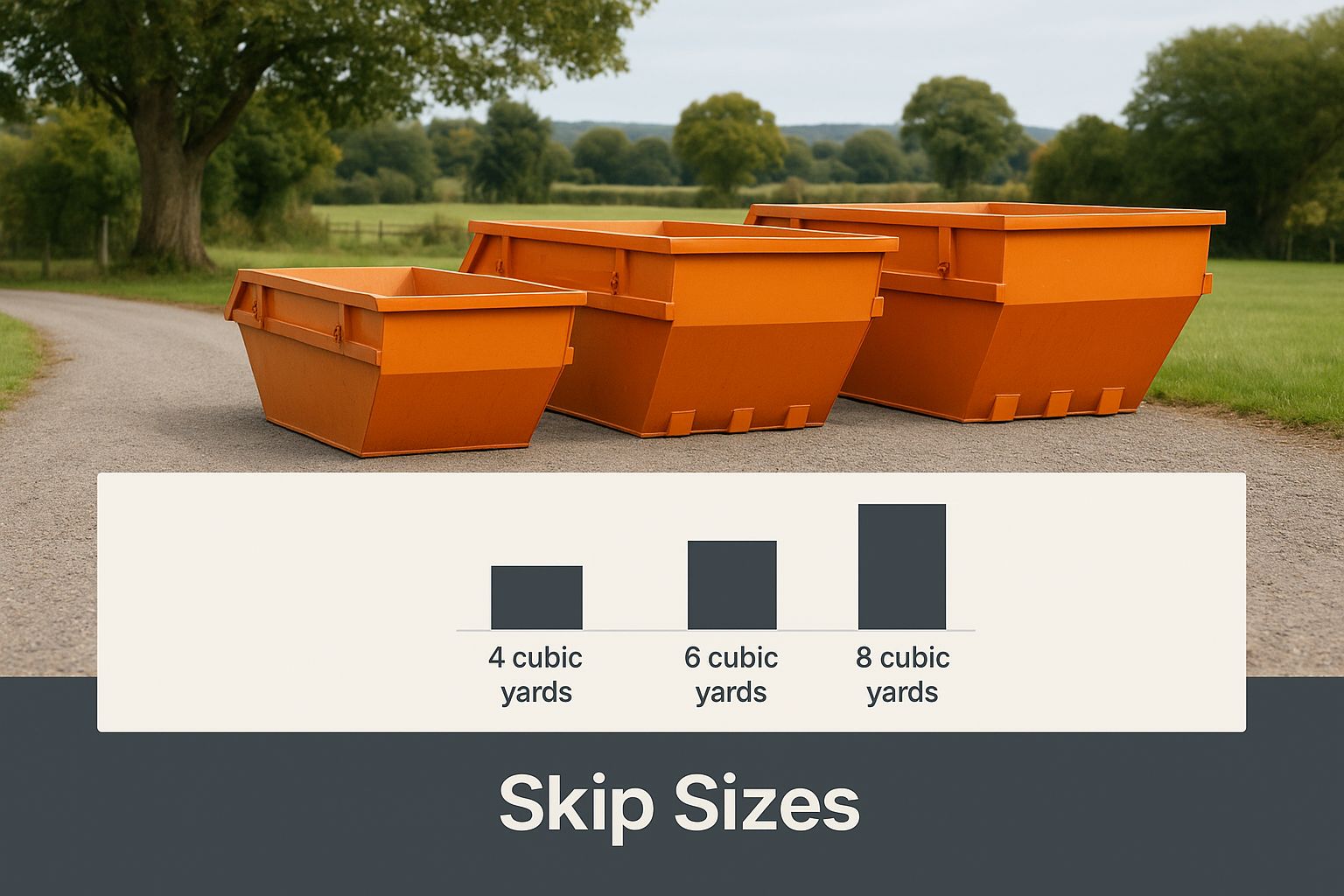
Seeing them all lined up really puts their capacity into perspective, doesn't it?
Making the Final Decision
If you’re still caught between two sizes, here’s a golden rule: always go for the bigger one.
It might feel wrong, but paying a little extra for a larger skip upfront is almost always cheaper than the shock of having to order a second one later on. Remember to think about what you’re throwing away, too. Old sofas and wardrobes take up a lot more room than heavy rubble or soil.
Pro Tip: When in doubt, round up. That little bit of extra space is a fantastic safety net for any unexpected waste you create along the way.
To make things even clearer, we’ve put together a simple table comparing the most common options.
Dorset Skip Size and Capacity Guide
Here’s a straightforward comparison to help you match a skip to your project's needs.
| Skip Size (Yards) | Approx. Bin Bag Capacity | Ideal For Projects Like |
|---|---|---|
| 2-Yard (Mini) | 20 – 25 Bags | Small garden clearances, single room decluttering, minor DIY jobs. |
| 4-Yard (Midi) | 40 – 45 Bags | Small kitchen or bathroom renovations, extensive garden waste. |
| 6-Yard (Small Builder's) | 60 – 65 Bags | Medium-sized renovations, bulky waste, office clear-outs. |
| 8-Yard (Builder's) | 80 – 85 Bags | Full house clearances, major construction work, commercial waste. |
Once you’ve got a clear idea of your waste, choosing the right skip becomes simple. If you're looking for even more detail, you can learn more about what size skip you might need in our detailed guide. A few minutes of planning now will save you a heap of time, money, and hassle down the road.
Navigating Skip Permits and Placement Rules
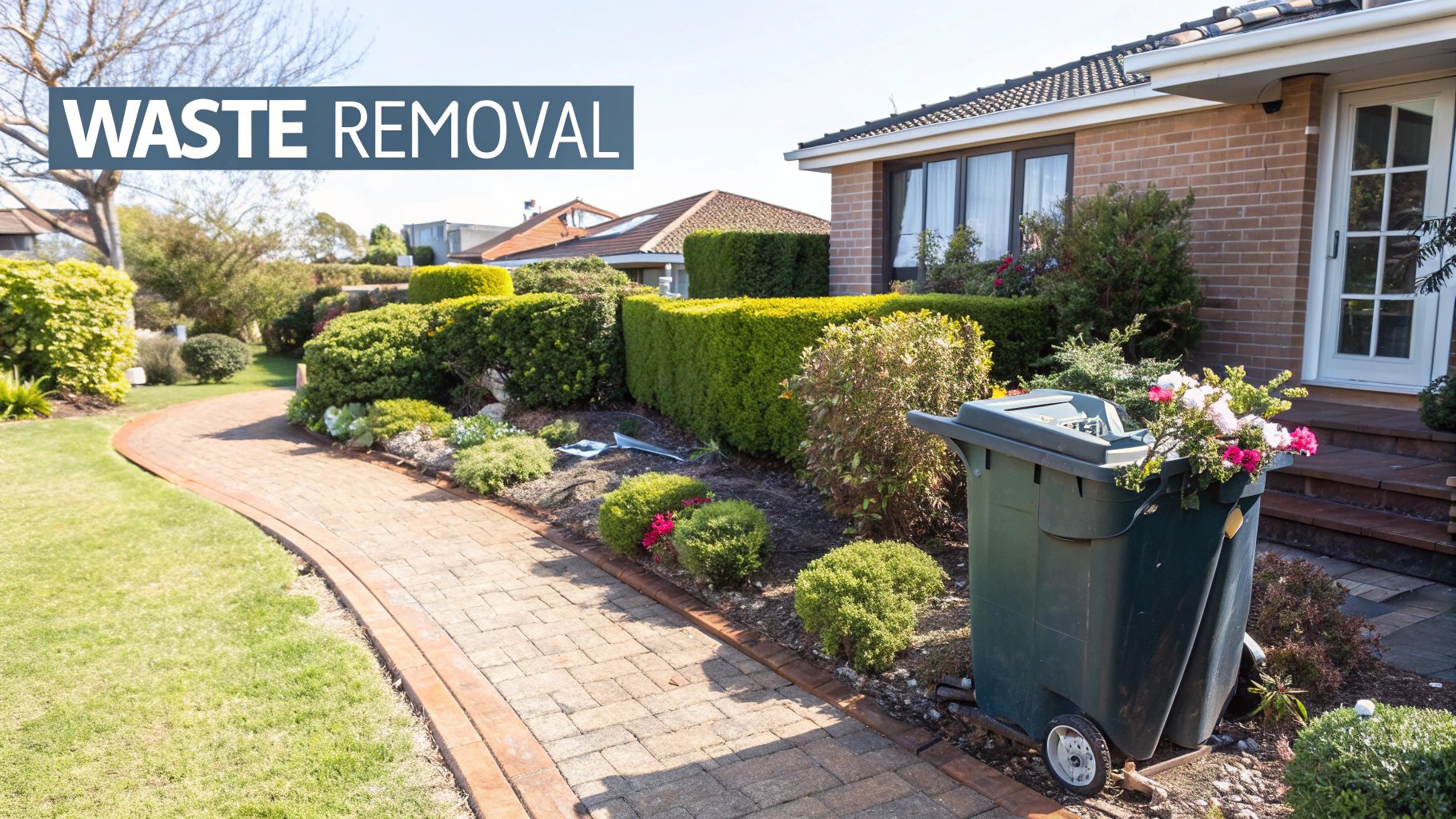
You've figured out the right skip size for your job – brilliant. Now for the next big question: where are you going to put it? It might seem like a simple matter of convenience, but the location of your skip is actually governed by local council rules here in Dorset.
Getting this wrong can cause delays and even fines, but don't worry, the rules are pretty straightforward once you know them.
It all boils down to one simple question: is the skip going on private or public land? If you can place the skip entirely on your own property – think your driveway, front garden, or a private building site – you do not need a permit. This is the easiest route and what most of our domestic customers do.
Things change the moment the skip needs to sit on public land. This means any part of a public road, a pavement, or even a grass verge. In that case, getting a skip permit is a legal requirement.
So, When Do I Need a Permit?
A skip permit is essentially the council's way of giving you official permission to temporarily take up a bit of the public highway. It’s all about making sure the skip is placed safely and doesn't cause an obstruction for drivers, pedestrians, or emergency services.
The good news is, you don’t have to deal with the paperwork yourself. When you hire a skip from a reputable company like The Waste Group, we handle the entire permit application for you. We know exactly what Dorset Council needs, saving you the hassle.
The most important thing to remember is that permits aren't issued on the spot. You need to plan ahead.
On average, you should allow between 3 to 5 working days for the council to process and approve a skip permit. It’s vital to factor this time into your project plan to avoid having your team standing around with no skip on site!
This lead time gives the council a chance to review the proposed location and make sure it ticks all the safety boxes.
Safety Rules for Skips on Public Roads
Placing a skip on a public road means it becomes a temporary hazard, so there are some non-negotiable safety rules we have to follow. These are all about making the skip as visible as possible, especially at night or in bad weather.
As your skip hire in Dorset provider, it's our responsibility to make sure your skip is fully kitted out with the right safety gear.
This typically includes:
- Traffic Cones: Placed strategically around the skip to guide traffic safely past.
- Reflective Markings: High-visibility strips on the skip so it shows up clearly in headlights.
- Safety Lamps: If the skip is staying overnight, it must have lights attached to each corner. This is a must for night-time visibility.
These aren't just 'nice-to-haves'; they're mandatory conditions of the permit. If a skip is found without them, the council can order its immediate removal and issue a hefty fine. By letting us handle it, you can relax, knowing everything is safe, legal, and above board.
What Can and Cannot Go in Your Skip
Knowing what to load into your skip is probably the most important part of the whole process. Getting it right isn't about jumping through hoops for the sake of it; it's about making sure your waste can be processed legally, safely, and with the environment in mind.
Think of it this way: when you fill your skip correctly, the entire journey for that waste – from your Dorset driveway to the recycling facility – runs without a hitch. You avoid any unexpected headaches or extra costs.
What You Can Put in Your Skip
Thankfully, most of the stuff you'll generate during a clear-out, renovation, or garden tidy-up is perfectly fine for a standard mixed waste skip. These are the materials that our partner recycling centres are geared up to handle day in, day out.
Here's a quick rundown of the usual suspects you can throw in without a second thought:
- General Household Waste: Old furniture, knackered carpets, plastics, and all the general bric-a-brac you find lurking in the loft.
- Garden Waste: Soil, turf, grass cuttings, leaves, and branches all get the green light.
- Wood: Think old fence panels, dismantled sheds, floorboards, and timber offcuts.
- Inert Waste: This is the heavy stuff – bricks, rubble, concrete, stone, and sand.
- Metal: Scrap metal like old copper pipes or radiators is absolutely fine, as long as it isn't an electrical item.
Don't worry about keeping these materials separate in the skip. It all gets sorted by a mix of machinery and human hands once it arrives at the licensed waste transfer station.
What You Cannot Put in Your Skip
Right, this is the bit you really need to pay attention to. Some items are a strict no-go for any skip because they're classified as hazardous, are a nightmare to recycle, or need specialist handling to protect people and our local environment.
Tossing any of these banned items in can mean the driver refuses to collect the skip, or you could face extra charges to cover the cost of their safe removal and disposal.
Important Note: These rules aren't just something we've made up. They're legal requirements set out by the Environment Agency to ensure waste is managed responsibly and our beautiful Dorset countryside is protected from contamination.
To be crystal clear, here are the items that must never go into your skip:
- Asbestos: Extremely hazardous and legally requires specialist removal and disposal.
- Plasterboard: This needs to be disposed of separately. When mixed with other waste, it can create a toxic gas, so it’s always kept apart.
- Batteries: Whether from a car or your TV remote, they contain heavy metals and toxic chemicals.
- Tyres: They’re banned from landfill and need a specific recycling route.
- Electrical Items (WEEE): The rule of thumb is, if it has a plug or a battery, it can’t go in. This includes fridges, TVs, microwaves, and computers.
- Liquids: No paint, solvents, oil, or any other chemicals.
- Gas Cylinders: These can be pressurised and pose a serious risk of explosion.
- Medical Waste: Any clinical or medical waste is strictly prohibited for obvious health and safety reasons.
If you’re ever scratching your head about a particular item, the best thing to do is just give us a call and ask before it goes in. For a deeper dive, you can learn more about what you can’t put in a skip in our comprehensive guide. For anything on the prohibited list, your local Dorset Council recycling centre will be able to point you in the right direction.
Your Step-by-Step Guide to Hiring a Skip
Hiring a skip doesn't have to be a headache. In fact, it's a pretty straightforward process once you know the ropes. Think of it less as a huge undertaking and more as ticking off a simple checklist. We’ll walk you through everything, from getting that initial quote to waving a final goodbye to your rubbish.
This guide breaks it all down into four easy steps. By the end, you'll know exactly what to expect, making your skip hire in Dorset experience smooth and hassle-free, whether you're a first-timer or a seasoned DIY pro.
Step 1: Assess Your Waste and Get a Quote
First things first: take a good look at what you need to get rid of. Is it bulky old furniture from a house clearance, heavy rubble from a garden project, or just a mix of general waste? Getting a rough idea of the type and amount of waste is crucial for picking the right skip size and avoiding any surprise costs down the line.
Once you know what you’re dealing with, it’s time to get a quote. Any decent local company will give you a clear, all-in price that covers delivery, collection, and responsible disposal, with no hidden fees.
Step 2: Schedule Your Delivery
With your quote sorted, the next move is to book the delivery. It’s always a good idea to schedule the skip to arrive a day or two before your project really gets going. This gives you a bit of a buffer and means you won’t be stuck with a mountain of rubbish and nowhere to put it.
Keep in mind that during peak times, like the spring and summer months, demand for skips across Dorset really ramps up. Booking a little further ahead is a smart move to make sure you get the size you need, right when you need it.
Step 3: Prepare the Drop-Off Spot
A bit of prep work on delivery day makes a world of difference. Make sure the spot where you want the skip placed is completely clear of any obstacles – we’re talking cars, plant pots, bags of cement, you name it. The delivery lorry needs a fair bit of room to manoeuvre safely, so a clear path is non-negotiable.
If the skip is going onto a soft surface like your lawn or a gravel drive, it's worth laying down a few old wooden planks first. This simple trick helps spread the weight and protects the ground from getting chewed up when the skip is lowered into place.
One golden rule of skip hire: never overfill it. Any waste poking out over the level fill line means the driver will have to refuse collection, as it’s a safety risk and illegal to transport. The standard hire period for a skip in Dorset is usually between seven to fourteen days, which is plenty for most jobs, though good local firms are often flexible. Find out more about the essentials of skip hire in Dorset on thewastegroup.co.uk.
Step 4: Load Your Skip Like a Pro
Now for the best bit – actually filling the thing. But don't just start chucking everything in randomly. To really get your money's worth, you need to load your skip strategically to maximise every last inch of space.
Follow these simple tips to become a loading champion:
- Flat items first: Lay things like old doors, fence panels, or big sheets of plasterboard flat on the bottom to create a solid, even base.
- Heavy stuff next: Now’s the time for the bricks, soil, and rubble. They'll settle into the gaps and weigh everything down.
- Break it down: Take a few extra minutes to dismantle old furniture or break up larger items. It's amazing how much space this saves.
- Fill the gaps: Finish by using all the smaller, lighter bits of waste to fill in any remaining nooks and crannies.
Follow these steps, and you’ll find hiring a skip in Dorset is a completely painless process, leaving you to get on with the actual project.
How Your Skip Contributes to Dorset Recycling
Ever wondered what happens to all your rubbish once our skip lorry drives off into the sunset? It’s a fair question. The good news is, it doesn't just get buried in a big hole somewhere. When you hire a skip with us, you’re plugging into a massive, well-oiled recycling machine right here in Dorset.
Your skip isn't just a bin; it's the first step in a local ecosystem that gives your old materials a new lease of life.
The moment we collect your skip, it’s taken straight to a fully licensed Waste Transfer Station. Picture this as a giant sorting office for waste. The entire contents are carefully tipped out, and a mix of high-tech machinery and sharp-eyed experts get to work separating every last thing.
The Journey from Skip to Second Life
The whole point of the transfer station is to salvage as much as possible, keeping it far away from landfill. It’s a pretty thorough process, breaking down what looks like a messy pile into clean, distinct categories.
- Soils and Hardcore: Think bricks, concrete, rubble, and soil. This stuff is screened and crushed down into new aggregates – the very materials used for building roads and foundations for new projects across Dorset.
- Wood: Old floorboards, fence panels, broken furniture… it all gets shredded. This shredded wood is then used to create biomass fuel or gets recycled into new products like chipboard.
- Metals: Any scrap metal, from old pipes to radiators, is pulled out with powerful magnets. It’s then sent off to be melted down and forged into brand new metal goods.
This whole process isn't just about being green; it’s becoming law. The government is getting much tougher on waste, and new UK regulations demand stricter separation to push recycling rates higher. For example, businesses with over 10 staff now have to separate their dry recyclables and food waste.
On top of that, a hefty increase in the landfill tax to £126.15 per tonne makes recycling a much more sensible option, and it's changing how waste is handled across the county. You can get the full rundown on these new regulations and what they mean for Dorset on warehamskiphire.co.uk.
By choosing a professional, responsible skip hire company, you're not just clearing out your junk. You're making a conscious choice to support a system that gives your waste a second chance and helps keep Dorset's environment healthy.
So, next time you watch your full skip being taken away, you can feel good knowing it’s not the end of the line. It's just the start of a new cycle that supports our local economy and keeps our beautiful county looking its best.
A Few Final Questions Answered
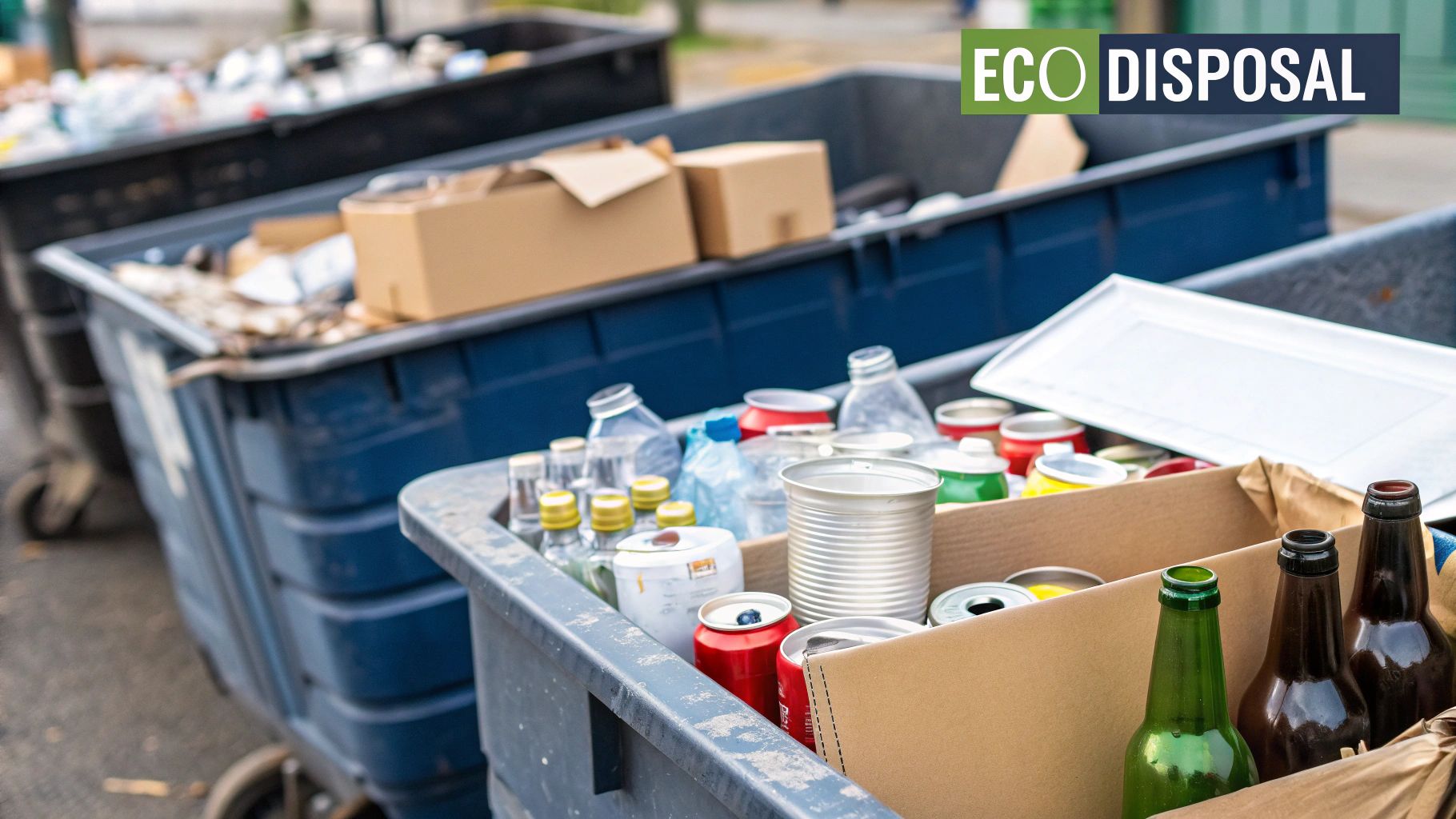
Even after covering all the bases, there are always a few specific questions that crop up when arranging skip hire in Dorset. We get it. To make sure you feel completely confident, we’ve put together some quick answers to the queries we hear most often.
Think of this as your quick-reference cheat sheet for those last-minute bits of head-scratching. It's all about making your skip hire experience smooth sailing from start to finish.
How Far in Advance Should I Book a Skip in Dorset?
A bit of forward planning always pays off, especially during the peak spring and summer seasons when everyone’s having a clear-out. If you can, try to book your skip at least 24 to 48 hours in advance. That usually gives us plenty of time to get your delivery scheduled without a hitch.
But, and this is a big but, the game changes if your skip needs to go on public land (like the road or a grass verge). You’ll need a permit, and that takes time.
You’ll need to allow an extra 3 to 5 working days for Dorset Council to process and approve the permit application. It's crucial you factor this in, otherwise you could be sat waiting for paperwork to clear while your project grinds to a halt.
There are no shortcuts with the council on this one, so make sure to build that time into your schedule if you don't have private land like a driveway.
What Happens if I Overfill My Skip by Mistake?
This is a really important one to get right. For safety and legal reasons, our drivers simply cannot collect an overfilled skip. It's against the law to transport an unsafe load. Every skip has a clear 'level fill' line painted on the side, and all your waste must stay below that mark.
If we arrive and the waste is piled high, you'll be asked to take the excess stuff out before we can reschedule the collection.
Unfortunately, this will likely lead to a 'wasted journey' fee to cover our driver's time and fuel. If you're looking at your pile of waste and feeling unsure it will all fit, the safest and cheapest option in the long run is always to order the next size up.
Can I Chuck Soil and Rubble in the Same Skip?
Yes, you certainly can. It’s absolutely fine to mix inert waste like soil, bricks, concrete, and rubble together in one of our standard mixed waste skips. These materials are all handled together when they get to the recycling centre.
The only thing to keep in mind is the weight. This stuff is seriously heavy! It's easy to go over the skip's maximum weight limit, especially with the larger sizes.
If your project is producing huge amounts of only soil and rubble, give us a call. It's worth asking about an 'inert-only' skip, as this can sometimes work out as a more budget-friendly option for you.
Ready to get your project underway with a simple waste solution? For dependable, next-day skip hire across Dorset with a price-match guarantee, you can count on the experts at The Waste Group.
